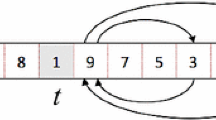Abstract
We present a GRASP algorithm to solve a problem that involves the sequencing of mixed products in an assembly line. The objective of the problem is to obtain a manufacturing sequence of models that generates a minimum work overload with a forced interruption of operations, which is regular in production, and in which, the production mix maintains the Quota property in the whole sequence. The implemented GRASP is compared with other procedures using instances of a case study of the Nissan engine manufacturing plant in Barcelona.



Similar content being viewed by others
References
Yano, C.A., Rachamadugu, R.: Sequencing to minimize work overload in assembly lines with product options. Manag. Sci. 37(5), 572–586 (1991). https://doi.org/10.1287/mnsc.37.5.572
Bolat, A., Yano, C.A.: Scheduling algorithms to minimize utility work at a single station on a paced assembly line. Prod. Plan. Control 3(4), 393–405 (1992). https://doi.org/10.1080/09537289208919409
Tsai, L.H.: Mixed-model sequencing to minimize utility work and the risk of conveyor stoppage. Manag. Sci. 41(3), 485–495 (1995). https://doi.org/10.1287/mnsc.41.3.485
Boysen, N., Fliedner, M., Scholl, A.: Sequencing mixed-model assembly lines: survey, classification and model critique. Eur. J. Oper. Res. 192(2), 349–373 (2009). https://doi.org/10.1016/j.ejor.2007.09.013
Scholl, A., Klein, R., Domschke, W.: Pattern based vocabulary building for effectively sequencing mixed-model assembly lines. J. Heuristics 4(4), 359–381 (1998). https://doi.org/10.1023/A:1009613925523
Bautista, J., Cano, A.: Solving mixed model sequencing problem in assembly lines with serial workstations with work overload minimisation and interruption rules. Eur. J. Oper. Res. 210(3), 495–513 (2011). https://doi.org/10.1016/j.ejor.2010.022
Bautista, J., Alfaro-Pozo, R., Batalla-García, C.: GRASP for sequencing mixed models in an assembly line with work overload, useless time and production regularity. Prog. Artif. Intell. 5(1), 27–33 (2016). https://doi.org/10.1007/s13748-015-0071-z
Bautista, J., Cano, A., Alfaro, R.: Modeling and solving a variant of the mixed-model sequencing problem with work overload minimisation and regularity constraints. An application in Nissan’s Barcelona Plant. Expert Syst. Appl. 39(12), 11001–11010 (2012). https://doi.org/10.1016/j.eswa.2012.03.024
Bautista, J., Cano, A., Alfaro-Pozo, R.: A hybrid dynamic programming for solving a mixed-model sequencing problem with production mix restriction and free interruptions. Prog. Artif. Intell. 6(1), 27–39 (2017). https://doi.org/10.1007/s13748-016-0101-5
Bautista, J., Alfaro-Pozo, R.: Free and regular mixed-model sequences by a linear program-assisted hybrid algorithm GRASP-LP. Prog. Artif. Intell. 6(2), 159–169 (2017). https://doi.org/10.1007/s13748-017-0110-z
Monden, Y.: Toyota Production System: An Integrated Approach to Just-In-Time, 4th edn. Productivity Press, New York (2011)
Aigbedo, H., Monden, Y.: A parametric procedure for multicriterion sequence scheduling for just-in-time mixed-model assembly lines. Int. J. Prod. Res. 35, 2543–2564 (1997). https://doi.org/10.1080/002075497194651
Fullerton, R.R., Kennedy, F.A., Widener, S.K.: Lean manufacturing and firm performance: the incremental contribution of lean management accounting practices. J. Oper. Manag. 32(7–8), 414–428 (2014). https://doi.org/10.1016/j.jom.2014.09.002
Miltenburg, J.: Level schedules for mixed-model assembly lines in just-in-time production systems. Manag. Sci. 35(2), 192–207 (1989). https://doi.org/10.1287/mnsc.35.2.192
Bautista, J., Cano, A., Alfaro, R., Batalla, C.: Impact of the production mix preservation on the ORV problem. In: Bielza, C., et al. (eds.) Advances in Artificial Intelligence. CAEPIA 2013. Lecture Notes in Computer Science, vol. 8109. Springer, Berlin (2013). https://doi.org/10.1007/978-3-642-40643-0_26
Feo, T.A., Resende, M.G.C.: Greedy randomized adaptive search procedures. J. Glob. Optim. 6(2), 109–133 (1995). https://doi.org/10.1007/BF01096763
Resende, M.G., Ribeiro, C.C.: Greedy randomized adaptive search procedures: advances, hybridizations, and applications. In: Gendreau, M., Potvin, J.Y. (eds.) Handbook of Metaheuristics. International Series in Operations Research & Management Science, vol. 146. Springer, Boston (2010). https://doi.org/10.1007/978-1-4419-1665-5_10
Bautista, J., Companys, R., Corominas, A.: Heuristics and exact algorithms for solving the Monden problem. Eur. J. Oper. Res. 88(1), 495–513 (1996). https://doi.org/10.1016/0377-2217(94)00165-0
Acknowledgements
This work was funded by the Ministry of Economy and Competitiveness (Government of de Spain) through Project TIN2014-57497-P (FHI-SELM2).
Author information
Authors and Affiliations
Corresponding author
Appendix I: Data of the set of instances Nissan-9Eng.I
Appendix I: Data of the set of instances Nissan-9Eng.I
Rights and permissions
About this article
Cite this article
Bautista, J., Alfaro-Pozo, R. A GRASP algorithm for Quota sequences with minimum work overload and forced interruption of operations in a mixed-product assembly line. Prog Artif Intell 7, 197–211 (2018). https://doi.org/10.1007/s13748-018-0144-x
Received:
Accepted:
Published:
Issue Date:
DOI: https://doi.org/10.1007/s13748-018-0144-x




